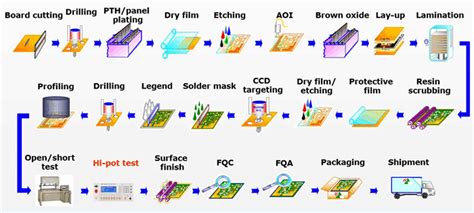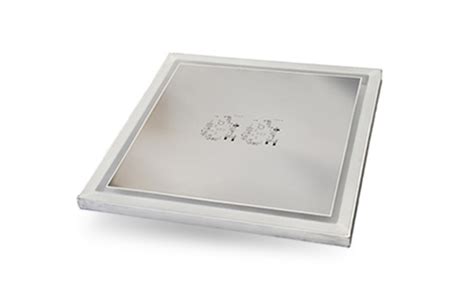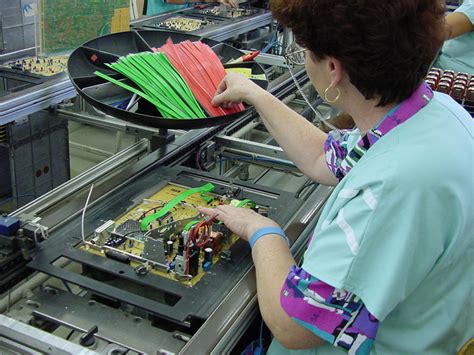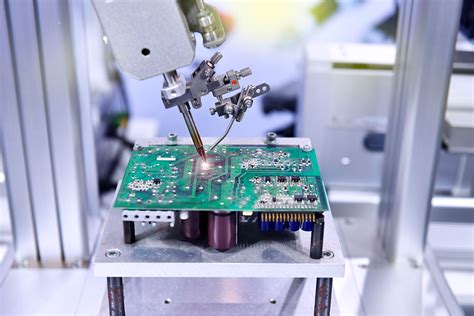Leading Circuit Card Assembly Manufacturers: Innovating the Future
Key Takeaways
The landscape of pcb assembly is constantly evolving, shaped by the innovations and strategies of leading manufacturers. These industry players are not just focusing on mass production; they are also emphasizing quality and efficiency in their pcba processes. As technology advances, the integration of cutting-edge components and materials is enhancing the performance and reliability of electronic devices, making them indispensable in everyday life. Furthermore, sustainability has become a critical concern; many manufacturers are adopting environmentally friendly practices to minimize their carbon footprint while meeting consumer demands. The role of automation cannot be understated, as automated systems streamline operations and reduce human error in the assembly process. The ongoing development within this sector indicates that the future will likely bring even more sophisticated pcb assembly solutions, driving innovation further in electronics and connectivity.
Introduction to Circuit Card Assembly: Defining the Landscape
The realm of circuit card assembly (CCA) has become a cornerstone of the modern electronics industry, providing vital connectivity and functionality to an array of devices. At the heart of this landscape lies Printed Circuit Board Assembly (PCBA), which represents the intricate processes involved in constructing and assembling components onto circuit boards. These processes range from soldering techniques to the use of advanced machinery that optimizes speed and efficiency, playing a critical role in the production of pcb assembly systems.
In recent years, the industry has witnessed an explosion of technological advancements aimed at enhancing both performance and sustainability. As manufacturers strive to create more compact, powerful, and energy-efficient solutions, they are adopting innovative practices that not only improve the quality of their pcba outputs but also reduce environmental impact.
Key players in this sector are continually pushing boundaries with pioneering designs and methodologies that address both consumer demands and industry challenges. This evolving landscape calls for a deeper understanding not only of technological advances but also how these innovations can integrate seamlessly with sustainability efforts across the entire supply chain.
| Aspect | Importance | Current Trends |
|---|---|---|
| Technology Adoption | Essential for competitive advantage | Increased automation |
| Quality Control | Vital for customer satisfaction | Real-time monitoring systems |
| Sustainability | Key for compliance and market demands | Eco-friendly materials |
As stakeholders from diverse sectors increasingly recognize the significance of cutting-edge pcb assembly solutions, this article aims to explore how leading circuit card assembly manufacturers are innovating to shape a connected world. The integration of automation, sophisticated material selection, and pioneering techniques are setting a new standard for what consumers can expect from their electronic devices, ultimately defining the landscape for years to come.
Key Players in Circuit Card Assembly: An Overview
The landscape of pcb assembly is shaped by a diverse array of manufacturers who are at the forefront of technological advancements. Among these key players, companies such as Flextronics, Jabil, and Sanmina have distinguished themselves not only through sheer volume but also by consistently delivering high-quality pcba solutions that meet the rigorous demands of various industries. Their commitment to innovation is evident in their investment in cutting-edge technologies, including advanced robotics and state-of-the-art testing methodologies, which enhance production efficiency and product reliability. Furthermore, these manufacturers play a critical role in driving down costs while improving the scalability of their operations, thereby addressing the evolving needs of an increasingly interconnected world. As we navigate this complex industry landscape, it becomes clear that collaboration and quality assurance among leading circuit card assembly firms are essential to sustaining progress and fostering future innovations in electronics. The ongoing evolution in this sector highlights the significant contributions these manufacturers make toward shaping modern connectivity solutions.
Innovations in Circuit Card Assembly Technology
The landscape of circuit card assembly (CCA) has been significantly transformed by various technological advancements that are setting new benchmarks in the industry. Leading manufacturers are now embracing cutting-edge techniques that streamline the pcb assembly process, enhance operational efficiency, and reduce costs. One notable trend is the integration of advanced materials, which improves durability and performance in demanding applications. The shift towards automation has also revolutionized the way pcba is conducted, enabling more precise assembly with minimal human error. Moreover, smart manufacturing practices such as real-time monitoring and data analytics have emerged, allowing manufacturers to optimize production schedules and respond swiftly to market needs.
“Innovation is the hallmark of progress; without it, industries stagnate.”
In addition to these advancements, there has been a marked focus on enhancing connectivity through improved design methodologies. By integrating miniaturization techniques, manufacturers can produce thinner and lighter circuit boards without compromising functionality. These innovations not only cater to evolving consumer demands for compact devices but also play a crucial role in empowering modern electronics that are indispensable in sectors like telecommunications and automotive technology. Emphasizing sustainability further complements these advancements; many leading players are adopting eco-friendly practices within their pcb assembly processes to mitigate environmental impact while continuing to deliver high-quality products. This proactive approach reflects a holistic view of innovation where technology development aligns with broader social responsibilities.
Sustainability Practices Among Leading Manufacturers
In recent years, there has been a significant shift towards sustainability among leading circuit card assembly manufacturers. These companies are increasingly recognizing the importance of eco-friendly practices in their pcb assembly processes. By adopting sustainable materials and manufacturing methods, key players in the industry not only reduce their environmental impact but also appeal to a growing demographic of conscious consumers. For instance, many manufacturers are opting for lead-free soldering techniques within their pcba processes, aligning with global regulations aimed at minimizing hazardous waste. Furthermore, the implementation of energy-efficient machinery and production methods contributes to lower carbon footprints, highlighting the industry’s commitment to sustainability. Additionally, initiatives such as recycling used materials and fostering a circular economy are becoming common practices. These efforts showcase that sustainability is not just a trend but a vital consideration that can drive innovation and efficiency within the circuit card assembly sector. As manufacturers continue to prioritize these practices, they pave the way for a more sustainable future in electronics and connectivity.
The Role of Automation in Circuit Card Assembly
The integration of automation in circuit card assembly (commonly known as pcb assembly) has revolutionized the manufacturing landscape by significantly enhancing efficiency and accuracy. With the rise of automation technologies, manufacturers can optimize their production processes, resulting in reduced lead times and lower operational costs. Automated systems allow for precision placement of components on printed circuit boards (PCBs), minimizing human error and ensuring that every printed circuit board assembly (pcba) meets stringent quality standards. Furthermore, these advancements in automation provide scalability; businesses can quickly adjust production rates to respond to changing market demands or product volumes. The role of robotics and machine learning is also increasingly prominent, with systems learning from previous production runs to improve yield rates continuously. In essence, automation not only streamlines the manufacturing process but also plays a pivotal role in supporting complex designs, thereby pushing the boundaries of what’s possible in the electronics sector. By investing in automated solutions, leading manufacturers are positioning themselves at the forefront of innovation, setting new benchmarks for productivity and performance within the circuit card assembly industry.
Future Trends: What’s Next for Circuit Card Assembly?
As technology continues to advance at a rapid pace, the future of pcb assembly and pcba systems is poised for significant transformation. One of the most promising trends is the integration of smart manufacturing techniques, driven by developments in automation and artificial intelligence. These advancements will facilitate more efficient circuit card assembly processes, enabling manufacturers to produce smaller, lighter, and more complex designs. Additionally, the growing demand for miniaturization in electronic devices will push manufacturers to explore innovative materials and techniques that enhance thermal management and signal integrity in pcb assembly. The emphasis on sustainability will also shape the future landscape as companies strive to reduce their environmental impact through renewable resources and eco-friendly manufacturing practices. By embracing these trends, leading manufacturers in the circuit card assembly industry are not only innovating for today but are strategically positioning themselves for a highly connected and efficient electronic future. The ongoing evolution of connectivity demands that these manufacturers remain agile and forward-thinking as they navigate this exciting frontier.
Case Studies of Successful Manufacturers
In the competitive realm of pcb assembly, understanding the success stories of leading circuit card assembly manufacturers provides valuable insights into effective strategies and innovative practices. One notable example is a prominent manufacturer that specializes in high-value pcba for the automotive industry. This company has revolutionized its production lines by integrating advanced automation technologies, resulting in enhanced efficiency and reduced time-to-market. Their focus on quality control, through rigorous testing methodologies, has established a benchmark within the sector, ensuring that every pcb assembly meets stringent safety and reliability standards.
Another exemplary case involves a manufacturer that emphasizes eco-friendly practices throughout its supply chain. By sourcing sustainable materials and implementing waste reduction initiatives, this company not only minimizes its environmental impact but also appeals to an increasingly eco-conscious consumer base. Their innovative approach to pcba design incorporates modular components, enabling easier repairs and upgrades—ultimately extending product lifecycles and reducing e-waste.
Lastly, a tech-focused circuit card assembly manufacturer has made significant strides in integrating smart technology into their processes. By leveraging data analytics, they optimize production schedules and monitor equipment performance in real-time—thus enhancing operational efficiency. This strategic use of technology not only drives down costs but also fosters innovation in product development while delivering high-quality pcb assembly solutions tailored to evolving market demands.
These case studies illustrate how successful manufacturers are not just meeting current demands but are also paving the way for future advancements in the circuit card assembly industry through innovation, sustainability, and smart manufacturing practices.
Conclusion: The Impact of Circuit Card Assembly on the Electronics Industry
The circuit card assembly (CCA) sector undeniably plays a pivotal role in the progression and innovation of the electronics industry. As various technologies continue to evolve, manufacturers specializing in pcb assembly are increasingly at the forefront of these advancements, ensuring that electronic devices are more compact, efficient, and powerful. The integration of pcba processes has streamlined production capacities while enhancing product reliability through sophisticated design and manufacturing techniques.
Leading players within this field are not only innovating designs but also optimizing their methodologies to support a rapidly growing demand for electronic components. As devices become increasingly interconnected, the significance of high-quality circuit card assemblies becomes ever more critical in facilitating seamless communication and functionality. These manufacturers emphasize precision and quality control, which are essential in producing resilient products that meet modern technological standards.
Moreover, the industry is witnessing a shift towards sustainable practices as manufacturers seek to minimize environmental impact while maintaining high performance in pcb assembly. With automation taking center stage in production lines, companies can achieve greater efficiency and consistency in their pcba processes. This evolution highlights an important trend: as the demand for electronic devices grows globally, circuit card assembly plays an instrumental role in ensuring that technology not only meets current needs but also anticipates future challenges. Ultimately, the impact of circuit card assembly on the electronics industry cannot be overstated; it will continue to drive innovation and shape capabilities across various applications for years to come.
Conclusion: The Impact of Circuit Card Assembly on the Electronics Industry
Circuit card assembly, commonly referred to as pcb assembly or pcba, is a foundational component of modern electronics, playing an essential role in virtually all devices that require electronic connectivity. The impact of leading manufacturers in this sector goes beyond just the physical assembly of circuit boards; they are at the forefront of technological advances that drive the entire industry forward. Innovations in pcb assembly techniques—ranging from more intricate manufacturing processes to the integration of smart technology—are helping improve efficiency, reduce costs, and enhance performance. With sustainability becoming an increasingly pivotal concern, many manufacturers are adopting eco-friendly practices in their operations, thereby not only enhancing their competitive edge but also contributing positively to global environmental efforts. Moreover, automation is revolutionizing pcba, streamlining production while maintaining high standards of quality control. All these factors underscore the profound influence that circuit card assembly manufacturers have on electronics innovation and connectivity. As we look ahead, it is clear that the advancements made in pcb assembly will continue to shape technologies across industries, proving that the future of electronics hinges on these key players’ ability to adapt and innovate.
FAQs
What is circuit card assembly (CCA)?
Circuit card assembly (CCA) is a manufacturing process that involves the production of printed circuit boards (PCBs), which are essential for the functioning of electronic devices. The process typically includes the placement of electronic components onto a PCB, soldering, and testing to ensure that the assembled board meets required specifications.
What does PCB assembly entail?
PCB assembly involves several steps, including design, fabrication of the board, component placement, soldering, and final inspection. It transforms raw boards into functional components ready for integration into larger electronic systems.
What are common applications for PCBA?
PCBA is utilized in various industries including consumer electronics, automotive, telecommunications, and healthcare. The versatility of these assemblies allows for innovative applications ranging from smartphones to medical devices.
How do manufacturers ensure quality in PCBA?
Leading manufacturers implement strict quality control measures that encompass all stages of production. This includes using advanced technology for automated inspections and adhering to international quality standards.
What innovations are shaping the future of PCB assembly?
Recent advancements include automation in manufacturing processes, enhanced testing methods, and environmentally friendly materials. These innovations are driving efficiency and sustainability within the circuit card assembly industry, allowing manufacturers to meet growing demands.
For more detailed information about PCB assembly, please visit our site: please click here.







